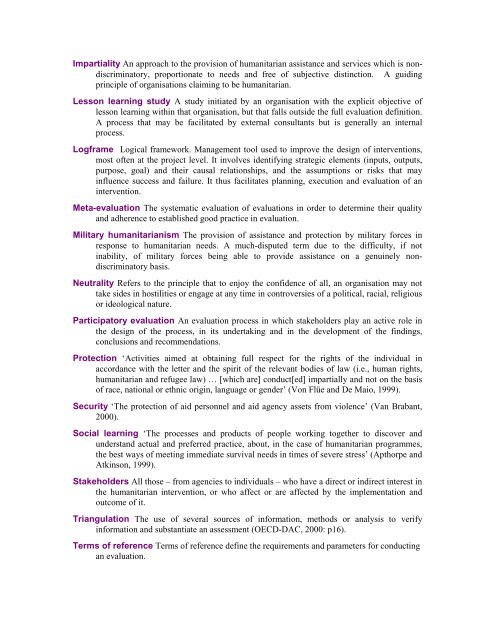Download PDF - ReliefWeb
Download PDF - ReliefWeb
Download PDF - ReliefWeb
You also want an ePaper? Increase the reach of your titles
YUMPU automatically turns print PDFs into web optimized ePapers that Google loves.
Impartiality An approach to the provision of humanitarian assistance and services which is nondiscriminatory,<br />
proportionate to needs and free of subjective distinction. A guiding<br />
principle of organisations claiming to be humanitarian.<br />
Lesson learning study A study initiated by an organisation with the explicit objective of<br />
lesson learning within that organisation, but that falls outside the full evaluation definition.<br />
A process that may be facilitated by external consultants but is generally an internal<br />
process.<br />
Logframe Logical framework. Management tool used to improve the design of interventions,<br />
most often at the project level. It involves identifying strategic elements (inputs, outputs,<br />
purpose, goal) and their causal relationships, and the assumptions or risks that may<br />
influence success and failure. It thus facilitates planning, execution and evaluation of an<br />
intervention.<br />
Meta-evaluation The systematic evaluation of evaluations in order to determine their quality<br />
and adherence to established good practice in evaluation.<br />
Military humanitarianism The provision of assistance and protection by military forces in<br />
response to humanitarian needs. A much-disputed term due to the difficulty, if not<br />
inability, of military forces being able to provide assistance on a genuinely nondiscriminatory<br />
basis.<br />
Neutrality Refers to the principle that to enjoy the confidence of all, an organisation may not<br />
take sides in hostilities or engage at any time in controversies of a political, racial, religious<br />
or ideological nature.<br />
Participatory evaluation An evaluation process in which stakeholders play an active role in<br />
the design of the process, in its undertaking and in the development of the findings,<br />
conclusions and recommendations.<br />
Protection ‘Activities aimed at obtaining full respect for the rights of the individual in<br />
accordance with the letter and the spirit of the relevant bodies of law (i.e., human rights,<br />
humanitarian and refugee law) … [which are] conduct[ed] impartially and not on the basis<br />
of race, national or ethnic origin, language or gender’ (Von Flüe and De Maio, 1999).<br />
Security ‘The protection of aid personnel and aid agency assets from violence’ (Van Brabant,<br />
2000).<br />
Social learning ‘The processes and products of people working together to discover and<br />
understand actual and preferred practice, about, in the case of humanitarian programmes,<br />
the best ways of meeting immediate survival needs in times of severe stress’ (Apthorpe and<br />
Atkinson, 1999).<br />
Stakeholders All those – from agencies to individuals – who have a direct or indirect interest in<br />
the humanitarian intervention, or who affect or are affected by the implementation and<br />
outcome of it.<br />
Triangulation The use of several sources of information, methods or analysis to verify<br />
information and substantiate an assessment (OECD-DAC, 2000: p16).<br />
Terms of reference Terms of reference define the requirements and parameters for conducting<br />
an evaluation.
















![CynefinFramework final [Read-Only]](https://img.yumpu.com/19017304/1/190x135/cynefinframework-final-read-only.jpg?quality=85)